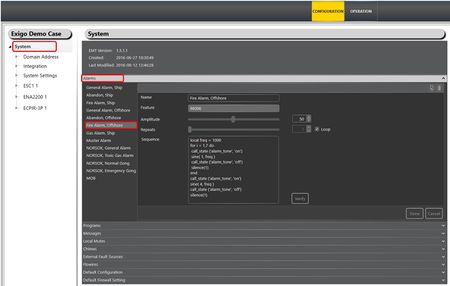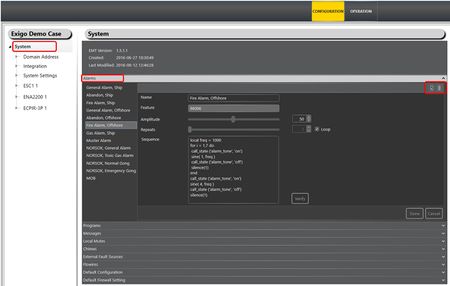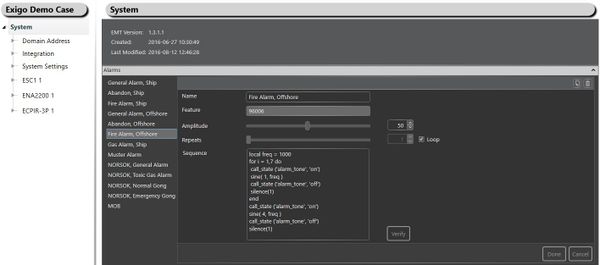Alarm Generator
This article explains how the Alarm Generator in Exigo can be used.
In Exigo, there are already some predefined Alarm Tones . But it is also possible to make custom Alarm Tones or customize the predefined alarms.
The Alarm Generator is located on the PSC (Primary System Controller) and the alarm tones are generated by the system controller.
Contents
Configuration
The Alarm Generator is configured using the EMT.
- In the device tree select System.
- Under detailed view select Alarms.
- Select the alarm you want to edit.
When you have finished editing press Done.
Add or Delete Alarms
It is also possible to create new Alarms that can be configured from scratch.
- In the upper right corner select the Add button to create a new alarm.
To delete an alarm you can use the Recycle Bin next to the Add button.
Alarm Generator Script
The Alarm Generator is based on simple script programming.
The programming language is based on Lua. For more information see this article.
Alarm Generator Example
- Script Example:
local freq = 1000
- for i = 1,7 do
- call_state ('alarm_tone', 'on')
- sine( 1, freq )
- call_state ('alarm_tone', 'off')
- silence(1)
End
call_state ('alarm_tone', 'on')
sine( 4, freq )
call_state ('alarm_tone', 'off')
silence(1)
Script Explanation:
- Local freq is a variable
- For <> end is a for loop which runs for i times
- Silence(seconds) is silence for seconds long
- Call_state is used for control outputs to see when alarm is off with follow alarm
- Sine(seconds, freq) is a sine tone lasting seconds long with frequency
This alarm is thus:
Seven repetitions of series with:
- Alarm tone of 1kHz for one second
- Alarm off for 1 second
Then alarm tone of 1kHz for 4 seconds
Then silence for 1 second before restarting sequence
Also known as General Alarm
Parameter details
Name: This is the name for the Alarm. This can be edited by the user.
Feature: This is the feature number for the Alarm. This is automatically created by the system.
Amplitude: The Amplitude is the volume for the Alarm.
Repeats: Number of repeats or loop for the Alarm sequence.
Sequence: This is where you put the actual alarm script.
Verify: With the verify button you can check that the script created is valid before it is saved.



